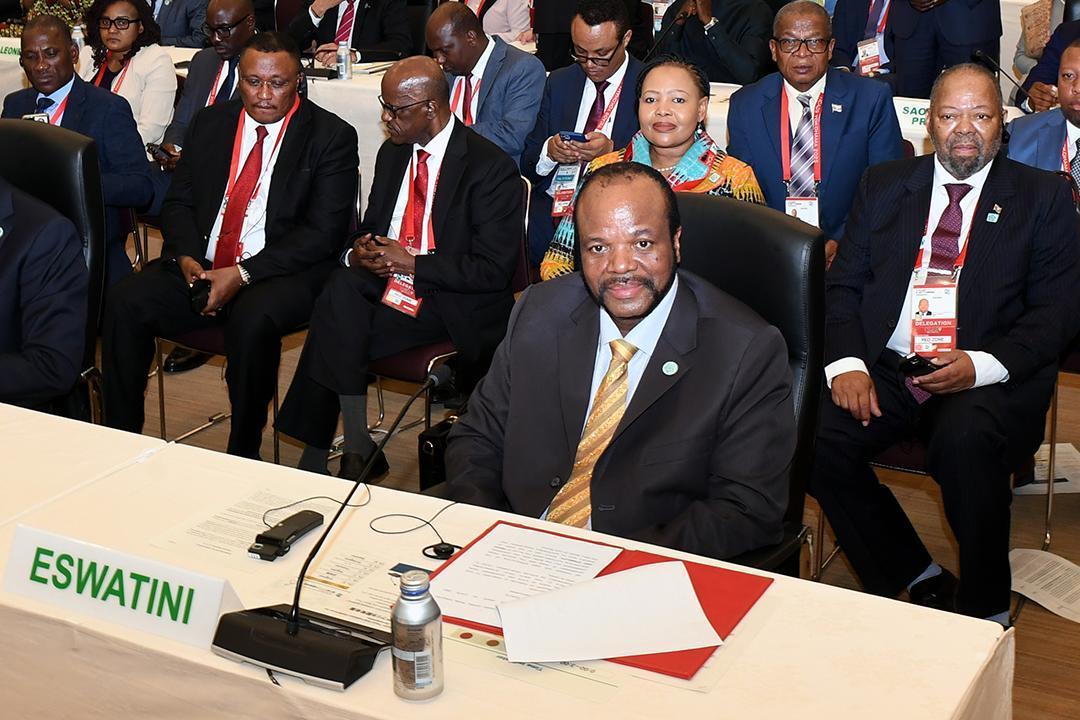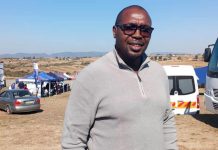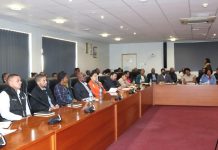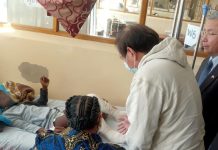Africa-Press – Eswatini. His Majesty King Mswati III has said that implementing the Ezulwini Consensus is vital for global peace and stability.
The Ezulwini Consensus, adopted by the African Union (AU) in 2005 during a meeting held in Eswatini, demands two permanent and five non-permanent UN Security Council seats for Africa to address historical imbalances.
The King said: “This reform will empower Africa to resolve conflicts peacefully, protecting civilians and fostering stability.”
Speaking at the Ninth Tokyo International Conference on African Development (TICAD 9) yesterday, His Majesty urged reform of the United Nations Security Council to ensure fair representation for Africa, as per the Ezulwini Consensus. He stated: “For peace and stability in our continent and the world, we must reform global institutions.”
As a member of the AU Peace and Security Council (2025–2028) and incoming Chairperson of the SADC Troika on Defence, Peace and Security, the King said Eswatini is committed to diplomacy and mediation. His Majesty commended the AU Peace and Security Council’s efforts, stating: “Their role in defusing conflicts is critical for Africa’s progress.”
The TICAD 9 summit, co-hosted by the AU, focused on peace, stability and economic cooperation under the Yokohama Aspirations. The king shared how the Tinkhundla system, is a model for peace saying: “Our home-grown governance model ensures national unity and stability, creating a secure environment for investments.”
He further assured that this stability supports TICAD’s goals of attracting investment for development. The King noted: “Eswatini guarantees the security of investments and fund repatriation, aligning with Africa’s economic aspirations.” TICAD’s support has already boosted Eswatini’s social and economic sectors, with potential for further partnerships in climate resilience and digital transformation.
According to government data, Japan has been providing essential food assistance to Eswatini since 2019, primarily through the United Nations World Food Programme (WFP). The Home-Grown School Feeding (HGSF) Programme provides meals to 25,000 pupils across 50 primary and secondary schools in Eswatini’s four regions, directly contributing to SDG 2 (Zero Hunger) and indirectly supporting SDG 4 (Quality Education).
Japan has also invested in educational infrastructure and advanced training programs, such as the Improvement of Secondary Schools Project, which aims to improve access to quality education. The ABE (African Business Education Initiative for Youth) / SDG Training Program provides postgraduate degree training opportunities for Eswatini nationals, fostering a mutually beneficial exchange of knowledge and expertise.
These initiatives aim to cultivate a highly skilled workforce capable of driving Eswatini’s economic diversification and contributing to the goal of achieving “first-world status.” Japan’s commitment to these initiatives aligns with SDGs 8 (Decent Work and Economic Growth) and SDG 9 (Industry, Innovation, and Infrastructure), which are preparing Eswatini for a more competitive and diversified economic future.
JAPAN BACKS EZULWINI CONSENSUS
By King’s Office Correspondents
YOKOHAMA, JAPAN – Japan has endorsed the Ezulwini Consensus to reform the United Nations Security Council and ensure Africa’s voice in global peace.
This endorsement was made by the former Japanese Prime Minister, Kishida Fumio, at the Ninth Tokyo International Conference on African Development (TICAD 9) yesterday. He was speaking during a session on peace and stability.
Representing the Japanese government, Kishida emphasised the need for fair African representation on the UN Security Council, as outlined in the Ezulwini Consensus. He stated: “Japan will work with Africa to achieve fair representation, sharing responsibility for international security.”
The Ezulwini Consensus, which was adopted by the African Union (AU) in 2005, calls for two permanent and five non-permanent UN Security Council seats for Africa to address global imbalances.
Kishida’s call aligns with Eswatini’s advocacy, as a member of the AU Peace and Security Council (2025–2028) and incoming Chairperson of the SADC Troika on Defence, Peace and Security.
Kishida highlighted Japan’s commitment to African peace through capacity-building for transparent elections and community resilience. He noted: “We aim to support transparent elections to ensure stability across African nations.” Japan will also advance the Women, Peace and Security (WPS) agenda, fostering women’s leadership and economic independence.
Kishida cited Japan’s projects in Northeast Nigeria and Liberia, stating: “These efforts build resilience in communities affected by conflict and climate change.” Japan said it will partner with the AU to support African-led solutions to violent extremism and political transitions. “Together, we can create a future of peace and prosperity, aligned with the AU’s Agenda 2063 and TICAD’s aspirations,” said the former prime minister.
AFRICA DESERVES BETTER – UN SECRETARY GENERAL
YOKOHAMA, JAPAN – United Nations Secretary General António Guterres has told African leaders at the TICAD 9 meeting that Africa deserves better treatment and recognition than what it currently receives.
“We meet at a time of interconnected crisis and deep inequalities and tackling these crises requires a clear focus not only on development for Africa but on development with Africa. I salute Japan for making this its focus for cooperation with the continent,” he said.
The UN chief said that for three decades, TICAD has embodied the spirit of multilateralism, grounded in mutual respect, shared responsibility and deep belief in Africa’s potential.
“With the world’s youngest population, abundant natural resources and vibrant entrepreneurial spirit, Africa is poised for progress. And this year’s theme, co-creating solutions, reminds us that some strengths can shape a more peaceful and sustainable world inside and beyond Africa’s borders, especially as we accelerate progress towards SDGs through investment, reform and partnership,” he said.
The Secretary General then highlighted five priorities that would see Africa being given the recognition it deserves.
“Firstly, we must reform the institutions of global governance, both political and financial, to reflect today’s reality. Africa must have a stronger voice in shaping the decisions that affect its future; that includes the long overdue reform of the Security Council. We are alive to the reality that Africa has no permanent seat and other regions remain under-represented.
“We are making the same call to the unfair and unjust international financial architecture that it must enhance African representation and endorse a strong African voice in the decisions it makes. We need bold action with debt relief. Today 34 countries spend more on debt service than they do on health and education. They need to triple the lending capacity from multilateral banks and their engagement in de-risking private investment in the African continent,” he said.
Secondly, the SG said there is a need to invest in global value chains and regional integration.
He said Africa’s path to prosperity must focus on adding value to raw materials, creating decent jobs and building resilience rather than only taking advantage of the African Continental Free Trade Area.
“We must also address Africa’s energy paradox: it has enormous renewable potential but receives just two per cent of global investment into renewable energy and 600 million Africans live without electricity. Africa is also home to the critical minerals required to power renewable technologies, but the countries hosting them must be the ones to benefit first and foremost while adding value to global value chains,” he said.
Guterres said thirdly, there is a need for the continent to embrace artificial intelligence for technology advancement.
He said, however, there are still many people suffering from the wide digital divide.
“Japan’s technical leadership can help close the divide and ensure that the technology of Africa gets sharp with adequate digital infrastructure rather than being left behind. This includes that all countries can harness the benefits of AI to power progress for all as we progress to the Pact for the Future,” the SG said.
“Fourth, we need a people-centred development. Young people are the builders of Africa’s future and we need to invest in their skills and education, particularly STEM, and ensure decent jobs, social protection and a seat at the decision table.”Let us invest in women’s full participation across economy and socio-political systems.
“Lastly, we must recognise that peace and security go hand in hand. Sustainable development requires sustainable peace. By silencing the guns, as the AU clearly pointed out and by ending violence in all its forms and strengthening social cohesion and stability that can attract business and investment to Africa,” he said.
The UN chief rallied the leaders to create solutions that can guarantee a future of dignity, opportunity and peace for all.
JAPAN PM RECOMMITS TO STAND WITH AFRICA
YOKOHAMA, JAPAN – Japan’s Prime Minister Ishiba Shigeru has recommitted his country to partner with the African countries and promised to deliver more jobs and infrastructure.
He has also promised to support peace and security efforts and good governance.
The prime minister was addressing African heads of State and governments at the Ninth Tokyo International Conference for African Development held here, which was also attended by United Nations Secretary General Antonio Guterres.
He said his country has enjoyed good relations with the African continent since 1993, when developed countries’ aid to the continent started to wane at the end of the Cold War.
The PM said Japan argued for the importance of Africa, and TICAD was the proof of his country not just taking action but also taking a lead and becoming a forerunner of Africa’s development.
The Kingdom of Eswatini has benefitted from concessional loans and grants in the construction of roads, water projects, built schools, food provision and various health projects.
Speaking to the African leaders and multilateral development partners, Shigeru said his government will partner with the African Development Bank in providing 5.5 billion US dollars to support public-private partnerships.
He said with the programme they are looking at affecting about 300 000 people, mainly youth and women, focusing on human development.
“We will work together in peace and security in Africa. Africa is participating in shaping the world order; hence, we need to strengthen the rule of law and good governance.
“We will also take concrete steps in supporting efforts to reshape and reform the United Nations Security Council and call for Africa’s permanent seats,” he said.
The premier said they will continue to work with Africa and reaffirms his country’s commitment to promoting investment into the continent.
AU OUTLINES FOUR SOLUTIONS TO GLOBAL CONFLICT
YOKOHAMA, JAPAN – The African Union (AU) has proposed four key pathways to addressing global conflict and strengthening peace efforts.
The Commissioner for Political Affairs at AU, Bankole Adeoye, identified regional security, multilateral cooperation, stabilisation and collective responsibility as critical solutions to challenges like violent extremism and climate-induced insecurity. He stated: “Africa is transforming with African-led solutions to confront our challenges.”
Adeoye said the first pathway of strengthening regional security, involves reconceptualising the African Standby Force to address conflicts in Somalia and the eastern Democratic Republic of Congo (DRC). He noted that the AU has committed US$20 million (about E340 million) to the AU Support and Stabilisation Mission in Somalia, funded through its peace mechanisms.
On the multilateral cooperation, which he described as essential, Adeoye urged Japan and partners to support AU initiatives in conflict prevention and early warning systems, saying: “These efforts make peace sustainable and affordable for our people.”
Regarding stabilisation and recovery through quick-impact projects, like rebuilding a school in Monrovia, Liberia, Adeoye said the future of the continent lies in resolving conflicts and reimagining peace.
On collective responsibility, he said this is rooted in the UN Charter and AU’s Agenda 2063, calling for investment in people and the environment.
AU’s four pathways to peace
Regional Security: Reconceptualise African Standby Force for conflicts in Somalia and DRC.
Multilateral Cooperation: Support AU’s conflict prevention and early warning systems.
Stabilisation and Recovery: Prioritise quick-impact projects for rebuilding communities.
Collective Responsibility: Invest in people and environment as per Agenda 2063.
For More News And Analysis About Eswatini Follow Africa-Press







